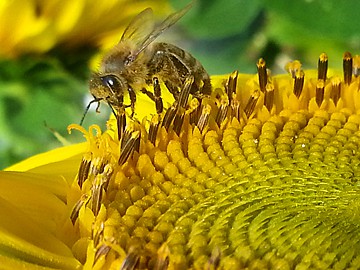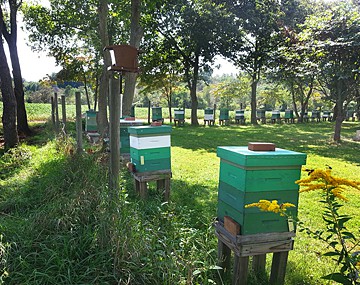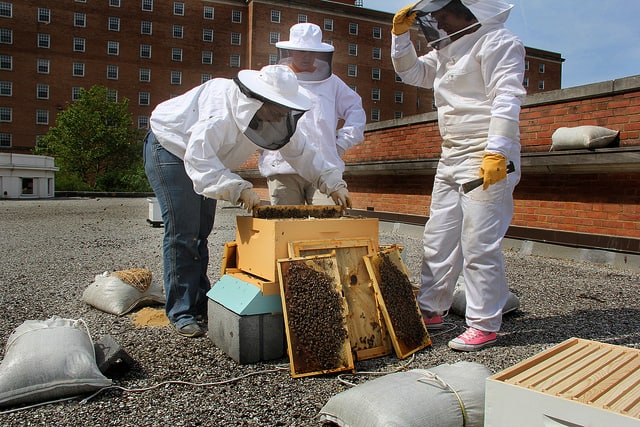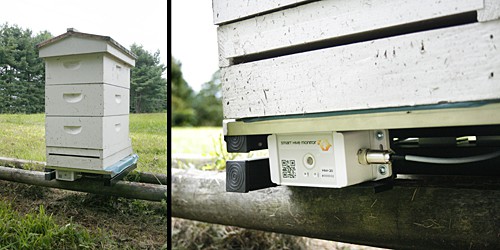We’ve received a huge outpouring of support from the University, beekeepers and bee enthusiasts for our Sentinel Hive project. Thank you! We've passed our initial $8K goal and will set up 8 Sentinel Hives throughout the state of Maryland this spring. Each additional $1000 we raise will be used to set up 1 more Sentinel Hive in Maryland and the surrounding states, giving us a more complete picture of the environment bees encounter and the struggles they face to stay healthy.
We still have time in our campaign: Help us fund 20 Sentinel Hives, guardians of honey bee health.
Honey bees are important pollinators, but they are currently threatened by a changing agricultural landscape. When flowers disappear, bees suffer from nutritional stress. Just like us, bees are more likely to get sick when stressed.Our honey bee research lab and disease diagnostic unit at the University of Maryland wants to help bees thrive. With your help we can launch a pilot Sentinel Hive program throughout the state. These hives act as an early warning system, so we can issue alerts to all beekeepers of escalating health problems and they can intervene to save their colonies. We’re seeking funds to build 8 of these Sentinel Hives in the University of Maryland area, providing us with important tools to do bee research that saves honey bees.
Our Sentinel Hives were featured on NPR's Metro Connection. Check out Dennis vanEnglesdorp and DC beekeeper Toni Burnham as they talk about issues facing beekeepers and how our Sentinel Hives can help.

Honey bees and other pollinators are responsible for every third bite we eat. These pollination efforts are valued at $15 billion annually, providing us with everything from almonds and apples to watermelon and pumpkins. Sadly bees are in decline nationwide and beekeepers currently experience high annual colony losses. Widespread colony losses endanger our food supply. We want to help beekeepers improve the health of their colonies through our Sentinel Hive program, a citizen science project that connects beekeepers and the general public.

Bees forage in a wide radius. A hive’s dinner plate covers 7,000 acres and expands up to 63,000 acres under nutritional duress. The health of a colony is directly linked to the food bees collect. As trees and plants flower, they provide nectar and pollen for bees. Colony weight increases as foragers return home with these precious resources. When bees can’t find flowers, the colony must use their food stores and thus loses weight. Just as we are more likely to get sick when stressed, bees can’t fight infections well when under nutritional stress.

Sentinel Hives monitor honey bee health in real-time using hive scales to track colony weight gain or loss, monthly disease assessments, and traps that collect some of the pollen bees bring home to determine available plant forage. The scale data is automatically transmitted to our servers and the patterns of nectar flow mapped. The goal is to collect enough information so that Sentinel Hives become early warning systems and we can alert beekeepers of potential problems due to increases in disease or lack of nutritional resources. The Sentinel Hives will allow us to develop data driven best management practices for beekeepers in real time, improving honey bee health for all beekeepers.

Gifts in support of the University of Maryland are accepted and managed by the University of Maryland College Park Foundation, Inc., an affiliated 501(c)(3) organization authorized by the Board of Regents. Contributions to the University of Maryland are tax deductible as allowed by law. Please see your tax advisor for details.
We’ve received lots of questions about how these Sentinel Hives work. We thought we would take a minute to explain in greater detail.
A Sentinel Hive = A Monitored Apiary: A Sentinel Hive is a monitoring system that functions in an established beekeeping apiary of at least 4-8 colonies. While we call this a Sentinel Hive program, it really requires an apiary, and up to 8 colonies in the same apiary are monitored concurrently for varroa mites and disease.
Hive Scale: The hive scale is placed on one hive. While we provide one scale, we will recommend that participating bee groups consider purchasing a second as occasionally one hive experiences unusual colony development.
Pollen Collection: A pollen trap will be provided and should be installed on one colony in the sentinel apiary, preferably the same colony as the hive scale. Participating beekeepers will be asked to engage the pollen trap for one day every 2 weeks and send us the pollen for analysis. Pollen quantity and variability results will be sent back to the bee club.
Bee Samples: Beekeepers will also be asked to take adult bee samples from 8 colonies in the sentinel apiary once a month for 6 months, and send the samples to us for varroa and nosema analysis. If the apiary has fewer than 8 colonies, only 4 hives will be sampled. We will provide the sample kits. Currently the cost of monitoring disease is subsidized by the Bee Informed Partnership grant and will continue to be subsidized next year (2015). Analysis results are usually provided within 2 weeks of receipt of samples.
Sentinel Hive Location: The initial pilot Sentinel Hives will be set up in apiaries managed by beekeeping organizations throughout the state of Maryland and surrounding states. If a participating beekeeping club does not have a club apiary, the Sentinel Hive can be placed in a member’s apiary, provided the member gives permission to have the data publically available.
Automated Alerts: During our pilot year we will start to develop automated alerts, so that beekeepers can use real time data to make informed management decisions. A rapid build-up in colony weight suggests supers may be necessary. It may be time to harvest honey when colony growth plateaus. As mite levels increase above economic thresholds, we will inform surrounding beekeepers that it may be time to intervene with treatments or have a treatment strategy in place.
Future Directions: We are really excited about the possibilities of this Sentinel Hive program. If successful, it can revolutionize the industry and help beekeepers reduce colony losses.
Exceeding our Goal: For each extra $1000 we raise, we will place one additional Sentinel Hive in a bee club yard. Help us expand our program, by sharing this information with family, friends, and other honey bee enthusiasts.
We would like to thank all of our donors for their support. Our special thanks to Dave Baggett, the CMNS alumni chapter, A.I. Root, Brushy Mountain Bee Farm, MD State Beekeepers Association (MSBA), Montgomery County Beekeepers Association, Howard County Beekeepers Association and NH Beekeepers Association.
Gifts in support of the University of Maryland are accepted and managed by the University of Maryland College Park Foundation, Inc., an affiliated 501(c)(3) organization authorized by the Board of Regents. Contributions to the University of Maryland are tax deductible as allowed by law. Please see your tax advisor for details.
Your contribution funds a pollen trap, so beekeepers learn what flowers their hives visit
Your contribution will fund monitoring of varroa mites, a parasite that attacks developing bees. AWARD: Tour of lab, where we sample bees for mites
Funds microscopic analysis of pollen, so beekeepers learn what flowers their bees are visiting. AWARD: Rooftop honey, produced by our UMD hives
Your donation funds a hive scale that tracks colony weight gains and losses, letting us know when hives grow or shrink. AWARD: Beekeeper for a Day; visit our UMD hives and view bees up close
Your donation funds a dual Sentinel Hive system for two years. AWARD: Dr. vanEngelsdorp will give a talk to your organization, if travel expenses are covered